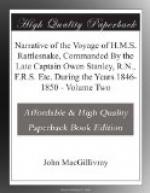(Footnote. Some of the fowling-sticks of the ancient Egyptians closely resemble the boomerang in form and appear to have been used in a similar manner, but I am not aware that anything approaching it has been seen elsewhere. A specimen which suggested this remark is exhibited in the British Museum Egyptian Room Case 36, 37 Number 5646.)
(**Footnote. The throwing-stick is completely represented in the Aleutian Islands (See in Ethnographical Room of British Museum, a specimen in case 16): in shape it differs from the Australian ones (which themselves vary in different localities) but the principle of construction and mode of use are precisely the same. In the islands of Tanna and New Caledonia a contrivance is in use to produce the same effect as the throwing-stick in propelling the spear; but, apart from other considerations, the nature of the instrument (a piece of stiff plaited cord six inches long, with an eye in one end and a knot at the other) is such as quite to preclude the probability of the Australians having derived their throwing-stick from this source.)
CHAPTER 2.3.
Death of Captain Stanley.
Sail for England.
Arrive at the Bay of Islands.
Kororareka.
Falls of the Keri-Keri.
Passage across the South Pacific.
Oceanic birds.
Stay at the Falkland Islands.
Settlement of Stanley.
Call at Berkeley Sound.
Lassoing cattle.
Resume our homeward voyage.
Call at Horta in the Azores.
The caldeira of Fayal.
Arrive in England.
Soon after our arrival in Sydney we had to lament the loss of our much respected commander, who died suddenly on March 13th, while apparently convalescent from a severe illness contracted during our last cruise—induced, I understand, by long continued mental anxiety, and the cares necessarily devolving upon the leader of an expedition such as ours, of which probably no one who has not been similarly situated can ever fully comprehend the responsibility. Thus died at the early age of thirty-nine, but after the successful accomplishment of the chief objects of his mission, Captain Owen Stanley, who had long before won for himself an honourable name in that branch of the naval service to which he had devoted himself, and whose reputation as a surveyor and a man of science stood deservedly high. Although it would ill become me as a civilian attached to the expedition to enter upon the services* and professional character of my late captain, yet in common with many others, I cannot refrain from adding my humble testimony to his worth, by recording my deep sense of many personal favours, and the assistance which was always liberally rendered me during my natural history investigations throughout the voyage, whenever the more important objects of the survey permitted.




